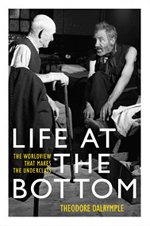Life at the Bottom: The Worldview That Makes the Underclass

Cover for Life at the Bottom
|
|
| Author | Theodore Dalrymple |
|---|---|
| Genre | Non-fiction, sociology, political |
| Publisher | Ivan R. Dee |
|
Publication date
|
2001 |
| Media type | Print (hardback & paperback) |
| Pages | 263 |
| ISBN | |
Life at the Bottom: The Worldview That Makes the Underclass is a collection of essays written by British writer, doctor, and psychiatrist Theodore Dalrymple and published in book form by Ivan R. Dee in 2001. In 1994, the Manhattan Institute started publishing the contents of these essays in the City Journal magazine. They are about personal , the mentality of society as a whole, and the troubles of the underclass. Dalrymple had problems in finding a British publisher to help him turn his individual essays into a collection, so he eventually turned to American companies for publication.
The main themes expressed in the collection include how an individual's worldview (Weltanschauung) affects their actions and the attitudes of those around them, the philosophy of social determinism, and why a lack of personal responsibility for one's actions results from an individual's beliefs in determinism. The writing style that Dalrymple explains these in was praised by reviewers for its clear, witty prose and for going immediately to the truth and heart of any matter that is being discussed.
Most reviews of the collection were positive, applauding how Dalrymple had utilised his experiences to create a work that gives a transparent look at poverty in England. The main detraction that reviewers had for the collection was that Dalrymple often became too opinionated in his writing while he was trying to get across the results of his experiences.
Between 1990 and 2000, "Theodore Dalrymple", whose real name is Anthony Daniels, worked as a physician at City Hospital and Birmingham Prison, both located in the Winson Green area of Birmingham, England. During this time, he wrote essays on topics related to his work, such as his discussions with patients and inmates. Individual essays began being published periodically in the American quarterly magazine City Journal in 1994. The collection does not contain all of the essays he wrote about his experiences, but only the ones he considered the best, whether for their humour or their truth.
...
Wikipedia
